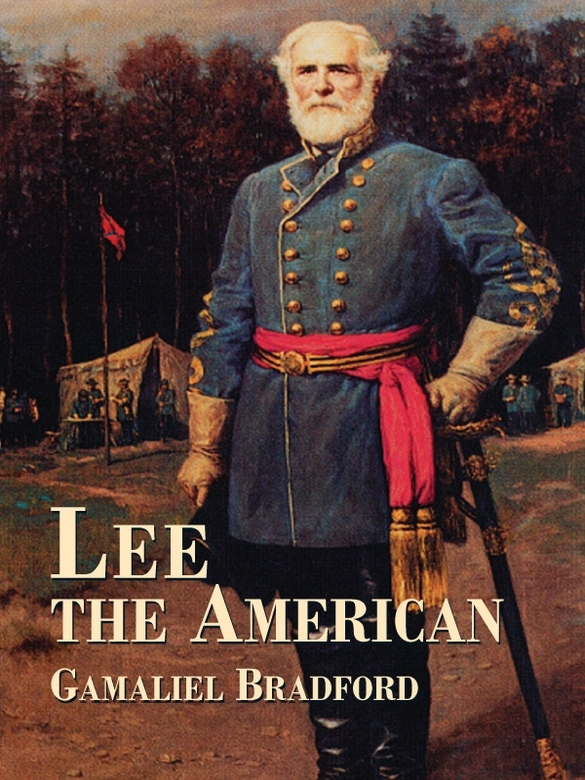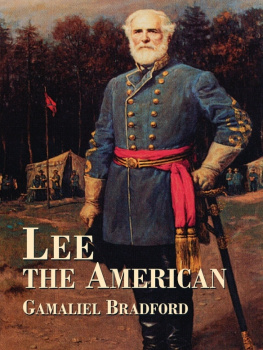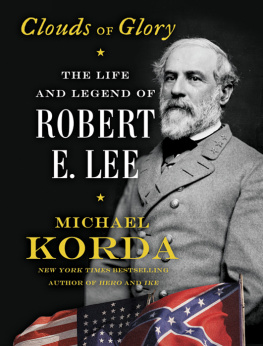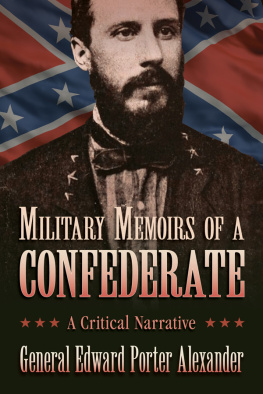Gamaliel Bradford - Lee the American
Here you can read online Gamaliel Bradford - Lee the American full text of the book (entire story) in english for free. Download pdf and epub, get meaning, cover and reviews about this ebook. year: 2012, publisher: Dover Publications, genre: Science. Description of the work, (preface) as well as reviews are available. Best literature library LitArk.com created for fans of good reading and offers a wide selection of genres:
Romance novel
Science fiction
Adventure
Detective
Science
History
Home and family
Prose
Art
Politics
Computer
Non-fiction
Religion
Business
Children
Humor
Choose a favorite category and find really read worthwhile books. Enjoy immersion in the world of imagination, feel the emotions of the characters or learn something new for yourself, make an fascinating discovery.
- Book:Lee the American
- Author:
- Publisher:Dover Publications
- Genre:
- Year:2012
- Rating:5 / 5
- Favourites:Add to favourites
- Your mark:
- 100
- 1
- 2
- 3
- 4
- 5
Lee the American: summary, description and annotation
We offer to read an annotation, description, summary or preface (depends on what the author of the book "Lee the American" wrote himself). If you haven't found the necessary information about the book — write in the comments, we will try to find it.
Sympathetic portrait of an enigmatic man who was a model of decorum and honor, a moderate on the issue of secession, a fierce fighter in battle, and a chivalrous soldier even in defeat. Exceptional sourcebook for students of American history, Civil War buffs, and admirers of the Southern general. 10 black-and-white illustrations.
Lee the American — read online for free the complete book (whole text) full work
Below is the text of the book, divided by pages. System saving the place of the last page read, allows you to conveniently read the book "Lee the American" online for free, without having to search again every time where you left off. Put a bookmark, and you can go to the page where you finished reading at any time.
Font size:
Interval:
Bookmark:

W HAT I have aimed at in this book is the portrayal of a soul. We live in an age of names and a new name has recently been inventedpsychography. This means, I suppose, an art which is not psychology, because it deals with individuals, not general principles, and is not biography, because it swings clear of the formal sequence of chronological detail, and uses only those deeds and words and happenings that are spiritually significant.
New names are often attached to old things. This thing is as old as Plutarch, as old as the Bible, as old as the first man who reflected on his fellows and sketched them with one brief word that made others reflect. What a portrait painter was Tacitus, and Clarendon, and Saint-Simon. But the nineteenth century, with its scientific training, brought more method to the work, more patient curiosity, more desire to base its results on deep research, and delicate discrimination. Matthew Arnolds essay on Falkland is an English masterpiece in this kind. Lowell wrote A Great Public Character. Mr. Rothschild, in his Lincoln: Master of Men, has drawn a full-length with loving care. And there are others too numerous to mention. But the prince of all psychographers is incontestably Sainte-Beuve. He is usually spoken of as a literary critic. In pure literature he has some limitations. As what he himself called a naturalist of souls he has never been surpassed, or equaled, or even approached.
The art of painting souls has its difficulties. First, one would wish to be fair-minded, impartial, free from prejudice. This is, I think, impossible, and the impartial historian, or biographer, that is, he who studies his subject in and for itself, without preconception or prepossession, without an instinctive disposition to misrepresent from one cause or another,does not exist. There are simply those who think they are impartial and those who know they are not.
To begin with, there is the cruder element of political, or religious, or social partisanship, from which none of us is wholly free. Tacitus can see little good in a Csar. Clarendon finds the Devils finger pushing Cromwell. Saint-Simon hates a parvenu. Mommsen has to justify the imperialism of Prussia in the imperialism of Rome. These are the extremes. Beside them Mr. Rhodes and Gardiner seem fair, dispassionate judges. Are they so? Mr. Rhodess admirable history is spoken of as perfectly impartialby Northerners. Southerners usually refer to it as the least partial of Northern histories. Certainly, in spite of all reserves and concessions, Mr. Rhodes throughout takes the Northern view of thingsas is natural and right. So Gardiner, for all his fairness, obviously praises the Puritans because they were Puritans, the Cavaliers although they were Cavaliers. Indeed, it is not impossible that the open, avowed, and evident partisanship of Clarendon (discarding, of course, all question as to accuracy of fact) makes safer reading than the disguised, insinuating partisanship of Gardiner.
But these established prepossessions of creed or preference are not the only obstacles to the psychographers impartiality. He is exposed to another danger which is greater according as his gift of artistic treatment and expression is greater. That is the danger of making his means more than his end, of taking such vigorous and startling measures to attract the attention of his readers and stir their passions that he emphasizes both the good and the evil in his subject far more than nature warrants or justice allows. This is the real weakness of such writers as Macaulay and Froude, far more than their political prejudices, just as, in a different order of literature, it is the weakness of Dickens. Macaulay doubtless loved the Puritans. But he loved a clever rhetorical touch far more than any Puritan. It was well to make his readers delight in the champions of liberty. It was even better to make his readers stare and gasp at the skill with which he painted a champion of liberty or a tool of Satan. Therefore his high lights are very high and his shadows very deep.
Lord Macaulay had, as we know, his own heightened and telling way of putting things, says Matthew Arnold. Sainte-Beuve also has his tranquil judgment on the clever and dangerous counsels of M. Macaulay, much in vogue at present. The best portraits, says that great historical painter, are perhaps those in which there is a slight touch of exaggeration.... Something is lost in exactitude, but much is gained in effect.... The less important features are neglected, but the great characteristic traits are permanently impressed upon the mind. It is thus that many great figures are revamped and made over long after they have passed away. I have said that Sainte-Beuve was a naturalist of souls. Macaulay might well be called a showman of souls.
In dealing with historical material of all sorts one finds it constantly necessary to be on ones guard against this tendency. Thus, with the innumerable anecdotes bearing on the Civil War, the plain, uncouth narrative of a soldier who has no pretension whatever to literature often gives the impression of being far more reliable than the polished version contributed by a John Esten Cooke or a George Cary Eggleston.
But this is not all. A psychographer may rid himself to a considerable degree of general prejudices. He may by habit and temperament grow to think first, last, and always of his subject, never of his effects (which is the sure cure for rhetoric). And still he may fall into an even more pervasive and treacherous form of misrepresentation: he may be misled by a personal affection for his subject, for his model, for what, in a certain sense, becomes almost his own child. Probably no biographer who is worth much is altogether free from this. It is the obvious cause of the undue partiality which Sainte-Beuve is said to show towards some of his minor figures, such as the Gurins. Gaston Boissiers portrait of Cicero is one of the most lucid, most limpid character studies ever made, absolutely free from any suggestion of rhetorical effect; but on every page you feel the painters love for his subject, and that the defects which are neither slurred nor palliated are touched in a very different spirit from that in which a lover of Csar would have touched them.
In our own war literature Hendersons Jackson is an excellent example of what I mean. There are few saner, more exact, judicial tempers than Hendersons. Not on any account would he deliberately have concealed or misrepresented any flaw or weakness in his hero. Yet, by some subtle, inexplicable alchemy, everything turns to Jacksons credit; and words and acts which might have been used by others only to make him repulsive and ridiculous serve in Henderson to make him heroic and lovable.
Finally, the psychographer has to contend with another humiliating difficulty, the indisposition to change his mind when it is once made up. You labor widely, through thousands of dull pages. Gradually your picture arranges itself in neat order and correct detail. You see your subject as you think it must finally stand. Then comes some little sentence in an out-of-the-way magazine, or some kindly correspondent reveals a flaw you could not have discovered, and large readjustment seems to be indicated. You are ready for itoh, yes. You accept it, if trueoh, yes. But it is surprising, the amount of ingenuity you expend in convincing yourself that it is not true, that it may be explained, disputed, adapted. When you come to your senses, you laugh at yourself; but you are so ready to do the same thing again!
All these subjective difficulties beset the charming art of the psychographer; but the objective are no less, perhaps greater. Every portrait of a character must be based finally upon that characters own words and actions. As regards actions, it is obvious that we depend entirely upon report, and little study is needed to make it plain that a mans own report is unreliable and that of others much more so. The reliability, indeed, varies. Report at third or tenth hand by incompetent witnesses differs considerably in quality from that transmitted by a trained observer in direct contact. But this latter is difficult to obtain and at the very best must be used with caution. A mans eyes are the servants of his mind and all minds are biased to some degree. Therefore the mass of biographical anecdote and reminiscence has to be sifted and tested by numerous almost instinctive criteria before it can be profitably employed.
Font size:
Interval:
Bookmark:
Similar books «Lee the American»
Look at similar books to Lee the American. We have selected literature similar in name and meaning in the hope of providing readers with more options to find new, interesting, not yet read works.
Discussion, reviews of the book Lee the American and just readers' own opinions. Leave your comments, write what you think about the work, its meaning or the main characters. Specify what exactly you liked and what you didn't like, and why you think so.






